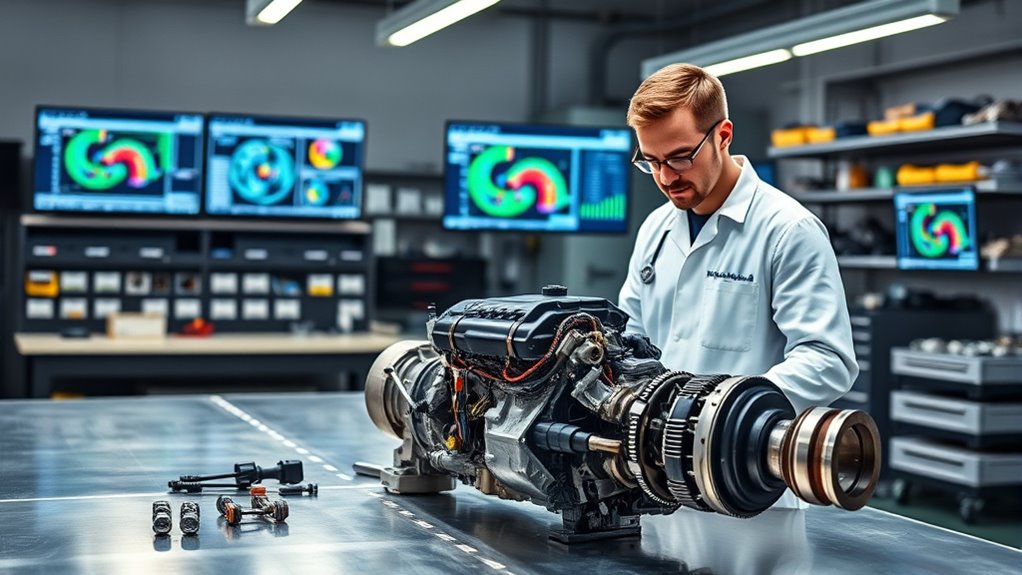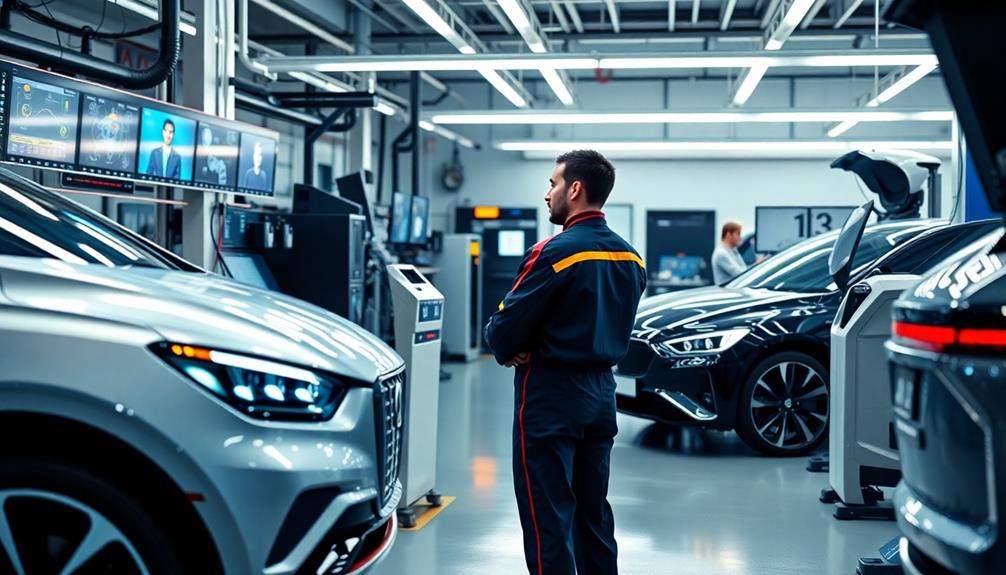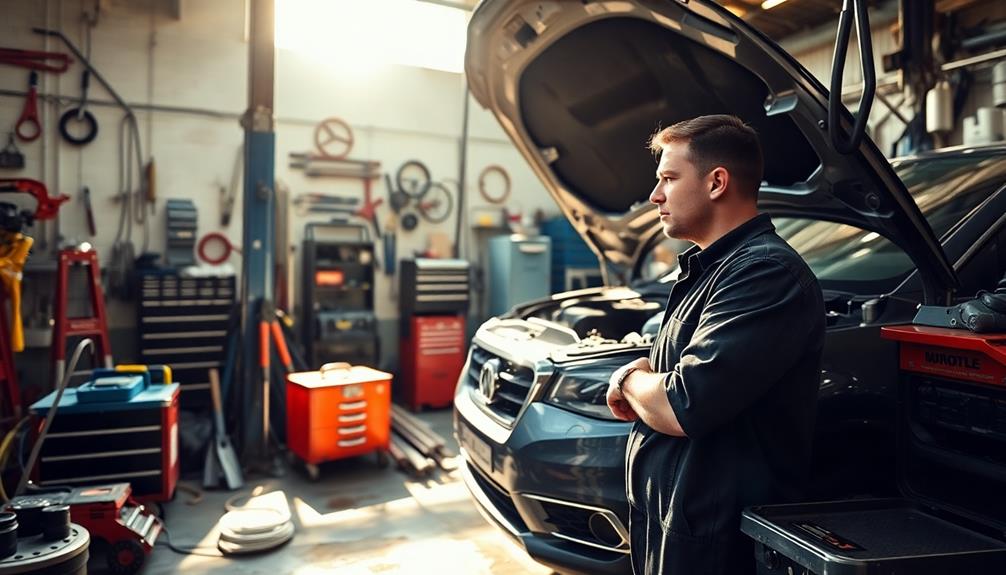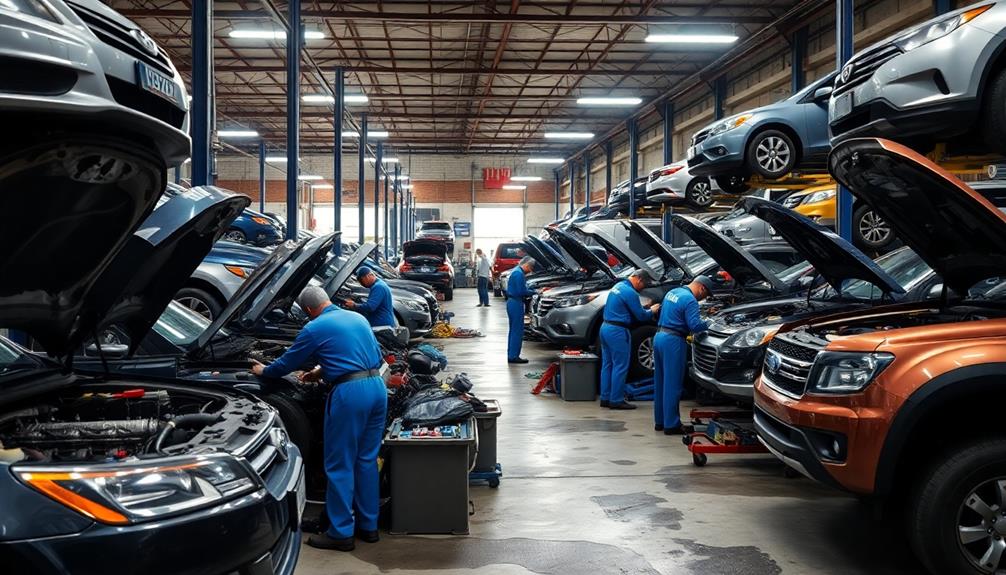A powertrain engineer designs and develops the systems that generate, transfer, and manage power in vehicles, ensuring they run smoothly, efficiently, and reliably. You’ll work on engines, electric motors, batteries, and control systems to optimize performance and fuel economy. Your role involves testing, simulation, and collaboration with other engineers to improve vehicle design. If you want to learn how these systems come together to create better vehicles, keep exploring further.
Key Takeaways
- Designs and develops systems that generate and transfer power to vehicle wheels.
- Ensures efficient, reliable operation of internal combustion, electric, and hybrid powertrains.
- Creates control algorithms for power source switching and seamless power delivery.
- Uses simulation and modeling tools to predict performance and troubleshoot issues.
- Collaborates with multidisciplinary teams to improve vehicle performance, efficiency, and safety.
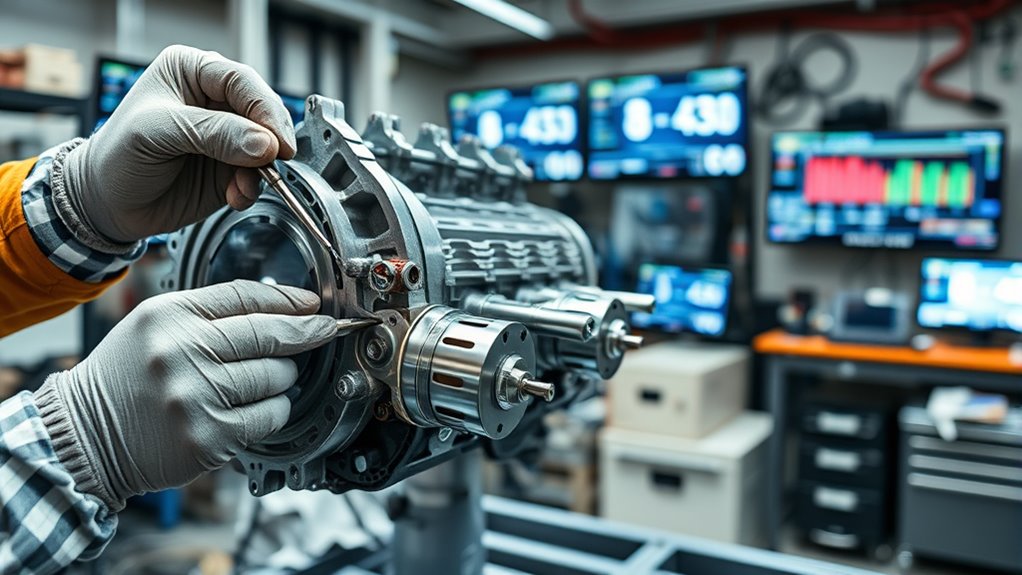
Have you ever wondered who designs the engines and transmissions that keep vehicles moving smoothly? That’s the job of a powertrain engineer. They’re the experts behind the complex systems that generate power and transfer it to the wheels, ensuring your vehicle runs efficiently and reliably. Today, the role has expanded beyond traditional internal combustion engines to include electric vehicles and hybrid systems. As vehicles evolve, so does the scope of a powertrain engineer’s responsibilities, making this a dynamic and essential profession in the automotive industry.
Powertrain engineers design the systems that power and transfer energy to keep vehicles moving reliably and efficiently.
When working on electric vehicles, you focus on the electric motor, battery management systems, and power electronics. You develop and enhance these components to maximize range, performance, and safety. Electric vehicle powertrains are simpler than traditional engines but require advanced knowledge of electrical systems, software integration, and thermal management. You also analyze how different driving conditions impact battery life and overall efficiency, constantly refining designs to improve user experience. Hybrid systems combine internal combustion engines with electric motors, demanding a nuanced understanding of both power sources. As a powertrain engineer, you work to seamlessly integrate these components, balancing power delivery, fuel efficiency, and emissions reduction. You design control algorithms that determine when the vehicle switches between electric and combustion power, ensuring smooth transitions and peak performance.
Your role involves extensive testing and simulation. You use computer-aided design (CAD) software to create detailed models and run simulations that predict how systems will perform under various conditions. These tests help identify potential issues before prototypes are built. Once a design is finalized, you oversee the manufacturing process, ensuring that each component meets strict quality standards. Your work doesn’t stop there; you continuously analyze data from real-world driving to make iterative improvements. This could mean tweaking a hybrid system’s control strategy or enhancing an electric vehicle’s battery pack to extend its lifespan. Additionally, understanding arcade machines can inspire innovative control interfaces and user engagement strategies in modern vehicle displays and entertainment systems.
Collaboration is key in this role. You work closely with other engineers—mechanical, electrical, software—to develop integrated systems that work seamlessly together. Your insights contribute to the development of cleaner, more efficient vehicles aligned with global sustainability goals. As technology advances rapidly, you stay updated with the latest innovations, whether that’s solid-state batteries, advanced transmission designs, or new hybrid architectures. Your work directly impacts the future of transportation by making vehicles more efficient, environmentally friendly, and enjoyable to drive.
In essence, a powertrain engineer is the driving force behind the mobility solutions of tomorrow. You’re at the forefront of innovation, tackling complex challenges with technical expertise and creativity. Whether working on electric vehicles, hybrid systems, or traditional engines, your contributions help shape the way people move through the world—making driving safer, greener, and more efficient for everyone.
Frequently Asked Questions
What Educational Background Is Required for a Powertrain Engineer?
You need a bachelor’s degree in mechanical engineering, automotive engineering, or a related field to become a powertrain engineer. Your education should focus on automotive design and engine technology, giving you a strong foundation in thermodynamics, fluid dynamics, and materials science. Some roles may require a master’s degree for advanced research or specialized work. Hands-on internships or co-op programs can also help you gain practical experience in engine development and automotive design.
How Does a Powertrain Engineer Impact Vehicle Efficiency?
You directly influence vehicle efficiency by optimizing engine performance, ensuring it runs smoothly and effectively. Your work helps reduce emissions by developing cleaner, more efficient powertrain systems. By improving fuel economy and refining engine design, you contribute to environmentally friendly vehicles. Your innovations lead to lower emissions and better performance, making a significant impact on sustainability and consumer satisfaction.
What Software Tools Do Powertrain Engineers Commonly Use?
You use advanced software tools like software simulation and CAD modeling to design and optimize powertrain systems. While software simulation helps predict performance and identify issues early, CAD modeling lets you create detailed 3D designs for manufacturing. Balancing these tools, you improve efficiency and innovation, turning complex ideas into real-world solutions. This juxtaposition of virtual testing and precise design hastens development and guarantees your powertrain performs at its best.
Are Powertrain Engineers Involved in Electric Vehicle Development?
Yes, you are involved in electric vehicle development as a powertrain engineer. You focus on powertrain design to optimize electric motors, batteries, and control systems for efficiency and performance. Your work guarantees electric vehicles deliver smooth acceleration, long range, and reliability. By integrating cutting-edge technology, you help shape the future of transportation, making electric vehicles more accessible, sustainable, and appealing to drivers worldwide.
What Are the Career Advancement Opportunities for Powertrain Engineers?
You have strong career growth potential as a powertrain engineer, with many opportunities to advance into senior roles or specialized fields like electric powertrains. In fact, industry reports show that engineers with advanced skills see a 25% higher promotion rate. By continuously developing your skills, you can move into project management, R&D, or leadership positions, ensuring your expertise remains valuable and your career stays on an upward trajectory.
Conclusion
As a powertrain engineer, you’re like the heartbeat of a vehicle, keeping everything running smoothly behind the scenes. Your skills and innovations drive performance, efficiency, and reliability. Without you, cars wouldn’t move forward—literally and figuratively. Think of yourself as the engine’s conductor, orchestrating each component to work in harmony. Your work fuels the future of transportation, making you essential to turning ideas into powerful, real-world machines.
